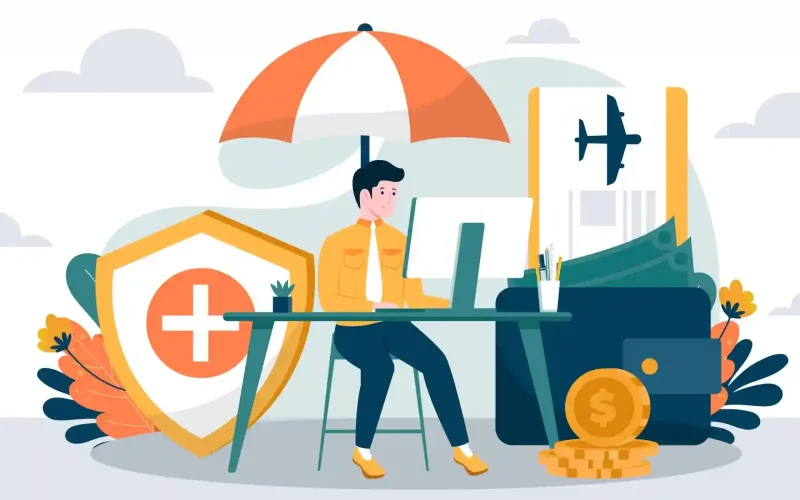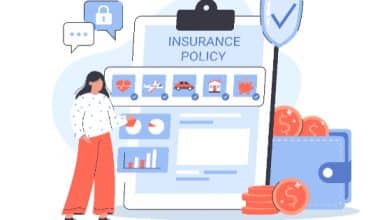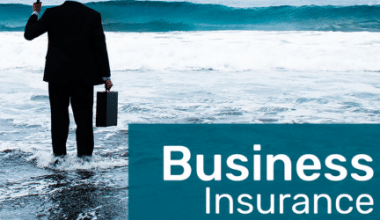Whether you have one or a few hundred employees, sell products or offer services, or command your operation from inside or outside your home, your insurance considerations as a small business owner are quite different from those of an individual consumer.
As small businesses climb their way up to profitability, they may face situations that can adversely impact their finances. Accidents and mistakes can lead to costly lawsuits, while natural and man-made calamities can easily wipe out their hard-earned revenue.
This is where having the right insurance comes in handy. Getting the right information on insurance for small businesses can be the difference between success or failure when things go wrong with your business.
What is small business insurance?
Small business insurance, sometimes called commercial insurance, helps protect a business’s assets, property, and income. A business owner’s policy (BOP) is the most common insurance product for small businesses, according to the Insurance Information Institute (III).
A BOP typically includes three basic types of coverage to help protect a business: business property coverage, general liability coverage, and business interruption coverage.
If you are a small business owner, you may also be able to buy additional insurance coverages to customize your policy based on your business’s specific needs. These additional coverages may include commercial auto coverage, errors and omissions coverage, key employee coverage, and more.
What Is a Business Owner’s Policy?
A Business Owner’s Policy (BOP) is a convenient and cost-effective insurance option for small businesses. It combines the coverage of all major liability and property insurance risks into one insurance policy package meant to specifically meet the coverage needs of small businesses.
This policy combines the following common insurance coverage options into one bundle:
- General Liability Insurance: To protect your company from loss caused by common liability risks, such as injury and property damage.
- Commercial Property Insurance: To cover your business property from natural disaster, civil unrest and crime.
- Business Income Insurance: To compensate you for the money lost following a disaster that caused your business operations to stop for a period of time.
Types of small business insurance
Commercial property insurance
A commercial property insurance policy protects the physical location of your small business and your business equipment, computers and office furniture. Owned and leased business equipment are both covered by this policy.
It takes a lot to make a small business go and there is a lot covered with a commercial property insurance policy. Tools, inventory, supplies, valuable papers and business records are all covered. Commercial property insurance also covers outdoor fixtures such as signs and fences.
A commercial property insurance policy typically applies to any loss to your small business property due to perils such as lightning, wind, hail and fire. It also covers theft and acts of vandalism.
Business liability insurance
As a small business owner, you may be legally responsible if a person’s property gets damaged while visiting your business, company or store. And if your business is responsible for someone’s injuries (not including an employee’s injuries), general liability insurance would pay for their medical bills and lost wages too.
General liability insurance protects a small business from claims of property damage and bodily injury. Other claims handled by general liability insurance include reputational harm, advertising injury and copyright infringement.
With the help of a business liability insurance policy, your small business will be able to maintain financial stability if you should get sued by a customer or other business. A general liability policy also pays for your legal costs, along with settlements and judgments.
Business Owners Policy (BOP)
A business owners’ policy (BOP) bundles general liability insurance, commercial property insurance and business interruption insurance together. It’s an affordable way to buy small business insurance, as buying the policies separately will mean higher prices.
Companies with 100 employees or fewer and revenues of up to about $5 million are good candidates for a BOP, according to the Insurance Information Institute.
Health insurance
Businesses that employ more than 50 full-time staff in the USA are required to take out health insurance for their workers, according to the Affordable Care Act (ACA). Most countries also have a standard number for this. For those with less than 50 employees, the ACA offers a Small Business Health Options Program (SHOP) as coverage.
Health insurance providers offer basic healthcare coverage to small businesses, along with other services that can include Medicaid and Medicare policies, long-term care insurance, dental coverage, and vision benefits.
Cyber liability insurance
A cyber liability insurance policy helps with the costs of cyberattacks and data breaches. Let’s say some private customer information gets leaked from your company’s database. If the customer files a claim against your company, cyber liability insurance will help pay for the costs.
Cyber liability insurance also will help pay for things such as notifying customers impacted by a data breach and offering them free credit monitoring.
Business interruption insurance
This replaces lost income from a small business if you need to temporarily shut down due to a loss covered by the policy, such as a lightning strike or a fire. Other perils covered by business interruption insurance include theft, wind and falling objects.
If any of these problems strike your small business, business interruption insurance pays for money lost because of damaged merchandise, lost earnings and additional expenses such as having to move the business to a new location on a temporary basis.
Commercial auto insurance
Commercial auto insurance for the cars, trucks and vans used for your small business.
A personal auto insurance policy typically excludes any business uses of a vehicle. This is why it is very important to get a commercial auto insurance policy if you have a company car, truck or van that you use for business purposes.
Hired and non-owned auto liability insurance provides liability coverage should employees rent or use their personal cars for business purposes.
If you fail to get business auto insurance for work vehicles, any claims you make could be denied. You would end up paying for any accident and other damage all on your own, which could get very expensive.
Errors and omissions insurance
If your small business provides a professional service or offers advice to clients, you should get errors and omissions insurance. This pays for costs resulting from mistakes that you make in your work.
Errors and omissions insurance will pay out to customers who make a claim against your small business for mistakes. These types of mistakes include misrepresentation, violation of good faith and fair dealing, negligence and giving false or inaccurate advice. It also pays for legal defense costs, judgments and settlements.
Without E&O insurance, you will always be reimbursing customers out of your own pocket and paying for a lawyer.
Types of small businesses that would benefit from errors and omissions insurance coverage include:
- Accountants
- Advertising agencies
- Graphic designers
- Interior decorators
- Management and business consultants
- Real estate agents
- Tax preparers
- Technology professionals
- Travel agents
Commercial umbrella insurance
Commercial umbrella insurance offers an extra layer of protection above the other liability insurance policies of your small business. Its purpose is to provide additional liability protection once you reach your liability limit on an underlying insurance policy.
For a typical business, the umbrella policy would provide protection beyond the general liability and auto liability policies. If a company has employment practices liability insurance, directors and officers liability, or other types of liability insurance, the umbrella could provide protection beyond those policy limits as well.
You can use a commercial umbrella policy with a general liability policy and a commercial auto policy. How much coverage you choose and the level of risk of your business determines how much you’ll pay for an umbrella policy.
Employment practices liability insurance
Employment practices liability insurance covers (up to the policy limits) damages for which an employer is legally liable such as violating an employee’s civil or other legal rights. In addition to paying a judgment for which the insured is liable, it also provides legal defense costs, which can be substantial even when there has been no wrongdoing.
Key employee insurance
Life or disability income insurance can compensate a business when certain key employees die or become disabled. These coverages cushion some of the adverse financial impact that results from losing a key employee’s participation.
Directors and officers’ liability insurance
Directors and officers liability insurance protects directors and officers of corporations or not-for-profit organizations if there is a lawsuit claiming they managed the business or organization without proper regard for the rights of others. The policy will pay any judgment for which the insured is legally liable, up to the policy limit.
It also provides for legal defense costs, even where there has been no wrongdoing.
Why do small businesses need insurance?
Small businesses need insurance to help cover the costs associated with liability claims, property damage and other catastrophes affecting business operations. If you don’t have business insurance, you’ll have to pay out of pocket for legal claims against your company and damage to your business property, which can easily bankrupt a small startup.
The average cost of a liability claim is now more than $15,000, according to the Insurance Journal.
In some cases, your small business might be required by law to carry certain insurance policies. For example, it’s likely that your state compels you to have workers’ compensation insurance if you employ workers. Also, if your business employs fifty or more workers, you’ll need to provide them with health insurance.
What classifies as a small business?
The U.S. Small Business Administration (SBA) defines a small business as an independent business that has fewer than 500 employees. However, this definition can vary by industry.
For insurance purposes, only small- to medium-sized businesses that meet certain requirements are eligible for a BOP, according to the III. Insurers may consider several factors when assessing whether a business is eligible for a BOP, which include:
Number of employees
One of the primary factors used to classify a business as small is how many people it employs. Typically, businesses with fewer than a certain number of employees are considered small. The threshold is determined by the insurance provider and can range from a handful of employees to several hundred, depending on the industry and the specific insurance policy.
Ownership structure
The ownership structure of a business can also impact its classification as small, according to the SBA. In some cases, insurance providers may consider factors such as whether the business is independently owned and operated or part of a larger corporate entity.
Industry classification
Certain industries have their own unique standards for defining small businesses. For example, the SBA sets industry-specific size standards based on the number of employees or annual revenue. These standards help determine eligibility for government programs and contracts.
Annual revenue
In addition to the number of employees, the SBA considers the annual revenue of a business when determining its size. Similarly, insurance providers may set a maximum revenue threshold for small businesses.
It’s worth noting that the definition of a small business may differ among insurance providers, so it is essential to carefully review your policies and consult with your insurance providers to ensure you meet the specific requirements for coverage.
How much does small business insurance cost?
The cost of small business insurance depends on your industry and the specific risk factors affecting your company. To evaluate the cost of your small business insurance coverage, an insurance agent will look at the following:
- The risk level of your industry
- The number of employees at your company
- The size, age and condition of your business property
- The location of your business
- Your annual income
According to a survey conducted by Insureon, the average yearly cost of business insurance is $1,281.
What are the major coverages of small business insurance?
Most small businesses need to purchase at least the following four types of insurance.
Liability insurance
Any enterprise can be sued. Customers may claim that the business caused them harm as the result of, for example, a defective product, an error in a service or disregard for another person’s property. Or a claimant may allege that the business created a hazardous environment.
Liability insurance pays damages for which the business is found liable, up to the policy limits, as well as attorneys’ fees and other legal defense expenses. It also pays the medical bills of any people injured by – or on the premises of – the business.
Property insurance
Property insurance compensates a business if the property used in the business is lost or damaged as the result of various types of common perils, such as fire or theft. It covers not just a building or structure but also what insurers refer to as personal property, meaning office furnishings, inventory, raw materials, machinery, computers and other items vital to a business’s operations.
Depending on the type of policy, property insurance may include coverage for equipment breakdown, removal of debris after a fire or other destructive event, some types of water damage and other losses.
Business auto insurance
A business auto policy provides coverage for autos owned by a business. The insurance pays any costs to third parties resulting from bodily injury or property damage for which the business is legally liable, up to the policy limits.
Workers compensation insurance
Workers comp insurance, as this coverage is generally called, pays for medical care and replaces a portion of lost wages for an employee who is injured in the course of employment, regardless of who was at fault for the injury. When a worker dies as a result of injuries sustained while working, the insurance provides compensation to the employee’s family.
An extremely small business, such as one operated by one or two people out of a home, may not need workers’ compensation insurance. But it often needs more property and liability insurance than is provided in a typical homeowners policy.
What should small businesses need to consider before buying insurance?
Thanks to the crucial role that insurance plays in protecting a small business, industry experts advise companies to shop around and compare options from multiple providers to make sure that they get the protection they need at the best possible price.
Here are the key criteria that specialists say small businesses must consider when choosing the right policies:
- Coverage options: Many policies look similar across insurers in terms of which perils will or will not be covered. Small businesses should ask their insurance providers about adding or extending coverages to suit their business needs.
- Premiums and deductibles: Experts warn small businesses against choosing the cheapest available policy, which could cost them tens to hundreds of thousands – potentially even millions in the long run. Companies should look for policies with premiums and deductibles that offer the best value for the amount of coverage and the relative level of risk facing their businesses.
- Policy limits: Businesses should make sure that the limit of each insurance policy can cover the full value of the protection they require.
- Company reputation: Businesses should look for insurance providers with a good track record for customer satisfaction and fair business practices.
- Claims reporting: Businesses should also make sure that they can navigate the claims process easily to minimize financial losses and disruptions to their operations. The process is often laid out in the product disclosure statement of the policy.
- Financial stability: Companies should make sure that their insurer is in good shape financially to cover claims that may arise.
Recommended Articles
- How to Get Small Business Insurance: Complete Guide
- 8 Best Insurance Providers For Small Business 2023
- DWELLING INSURANCE: How Much Dwelling Coverage You Need






